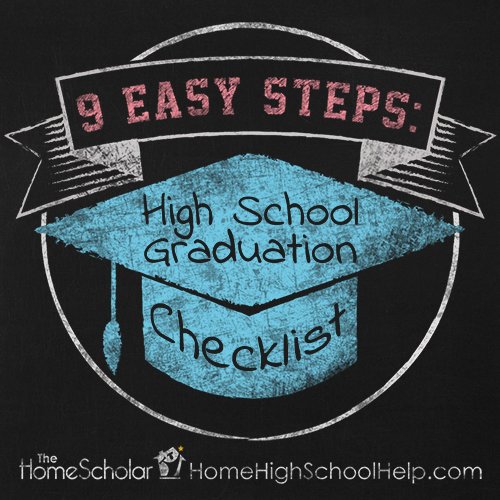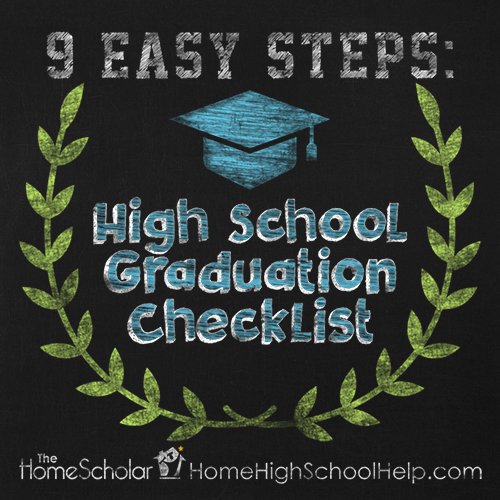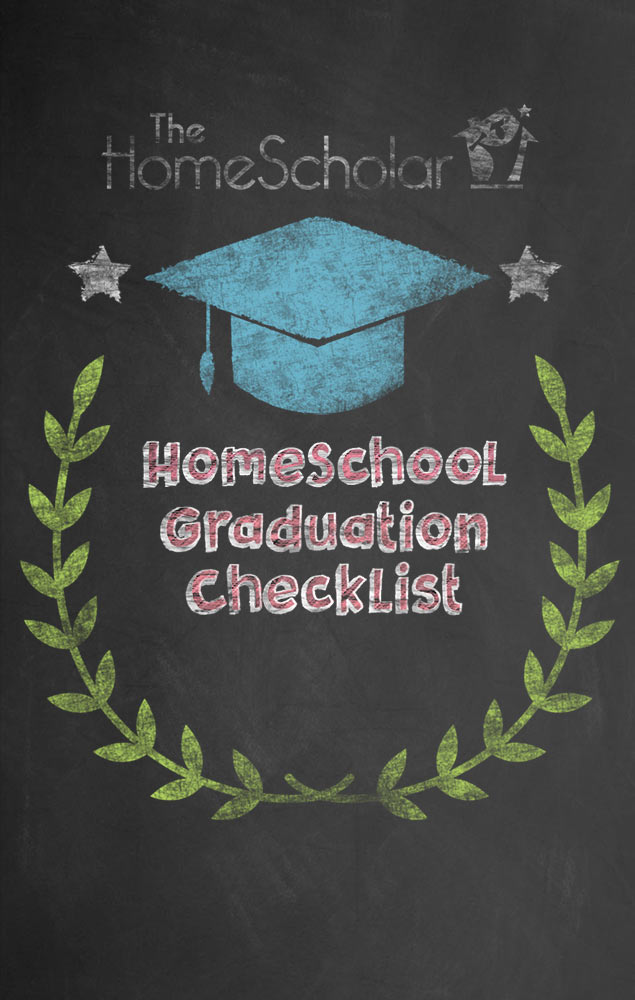Homeschool Graduation - in a Nutshell
I remember the spring before my boys homeschool graduation. It was a time of tremendous excitement and stress. We were planning a big graduation celebration and my friends were helping me with the decorations and invitations. But planning high school graduation should begin long before the party. It should begin the day you decide to go the distance and homeschool your child all the way through high school! Whether you are the parent of a middle schooler, trying to understand the coming years, or the parent of a high schooler wanting to do a check-up, let me help.
No matter where you are in the process, this simple homeschool graduation checklist will be useful.
1. Aim for College
2. Plan Homeschool Courses

3. Plan for High School Tests
High school testing can cause stress for parents and students. What test should your child take when, and how do you know? Most of these answers are found on two websites: The College Board® and ACT®.org.
I recommend having your child take the PSAT/NMSQT® in October of 10th grade for fun, and again in October of 11th grade. This will give you information about their test taking abilities, and which tests might be best for them. After that, your child may need to take two kinds of tests. Virtually all colleges require a test such as the SAT®, ACT®, or CLT. Give your child a complete sample test, timed and in the comfort of your home, where nobody will get hurt, rewarding them with a sweet treat if necessary. Taking a sample ACT® and SAT® is the single best way to decide which test is naturally best for your child. Then choose the right study materials, specific to the test they will take. Practice regularly, three or four times a week, until they take the test.
The other kind of test many colleges expect to see is one or more subject tests, such as an AP® Test, or CLEP. Subject tests can be helpful for earning scholarships as well as admission. Choose the right test for your child so they can pass with flying colors. Study for the test at home with your child, to be sure they will pass when they take it for real. Never have your child take a test if you believe they will not pass. Subject tests are best taken immediately after they complete each subject. Consider AP® exams when those courses are complete as well. They are more intensive subject tests, but they can earn college credit!
4. Encourage Extracurricular Activities in High School
5. Choose "Perfect-Fit" Colleges
Finding a college is more than watching where your friends and neighbors’ children go to school. Take your sophomore or junior to a college fair and/or search online for the perfect college match for your student. Once you have some possibilities, visit the college in person. Visiting is the only way to see if it’s a perfect match. Try to whittle down the list to a handful of colleges by the end of junior year. When you visit, ask about their homeschool admission policy. Find out what records they want from you, and any additional testing requirements.
By the end of junior year, make a list of four to eight colleges where your child will apply, including both public and private colleges. Choose a mix of reach, fit, and safety universities. A "reach" school has higher average test scores than your child’s, but they meet the college requirements. Be careful, though, because all Ivy League and military academies are reach schools, no matter how high your child’s scores might be. A "fit" college score is about the same as your child’s score, and they meet the college requirements. A "safety" school means your child’s test scores are higher than the college scores, and they exceed the college requirements.

6. Consider College Finances
7. Prepare Homeschool Records for High School
8. Apply to College

9. Be Confident in the Benefits of Homeschooling
Senior Year Last-minute 12-Step Emergency Panic Plan for College Admission

TLDRTO (Too Long, Didn't Read, Totally Overwhelmed)
Recommended Resources

Do you need a boost of encouragement and lots of proven tips to help you have your most successful homeschool year yet? Let me help you. Take my free recorded class filled with tips, and it even counts as continuing education! I know there are homeschool parents who can compete in the Tour de France while nursing their newborn and teaching their high schoolers Advanced Latin. This class in not for them.
This workshop is for those mortal, human, sometimes frail and tired homeschoolers, who truly want to do the best job possible preparing their children for college, but could use a little extra "boost." I promise you will learn solid strategies that will make homeschooling easier and more rewarding for both you and your children! Listen to it and let me know what you think!

There’s nothing more stressful to parents than college admission and scholarships. Many parents question whether it’s even possible to find a college that satisfies both parent and child, a college that will love their student and offer them scholarships to attend. Learn the secrets to successfully navigate the college process from start to finish, including selecting a college, negotiating college fairs, earning merit-based scholarships, and marketing your student effectively.
Receive gentle encouragement and practical help from a mentor who really understands. Relax and enjoy a casual conversation, sprinkled with scripture, humor, valuable tips, and quotes from The Princess Bride! Whether you’re looking at college entrance for your first graduate or want to do better with your next child, you will find countless treasures in this book.

If you are a beginner at homeschooling high school, consider the High School Solution, which provides detailed training on homeschooling, from middle school through senior year. The resources included give specific help for all stages, from getting started and planning high school courses, to understanding high school testing and college admission and scholarships.
Get complete instruction for choosing curriculum, encouraging delight directed learning, and teaching advanced subjects through training classes for parents, all with handouts or workbooks plus articles and templates.

 Login
Login


